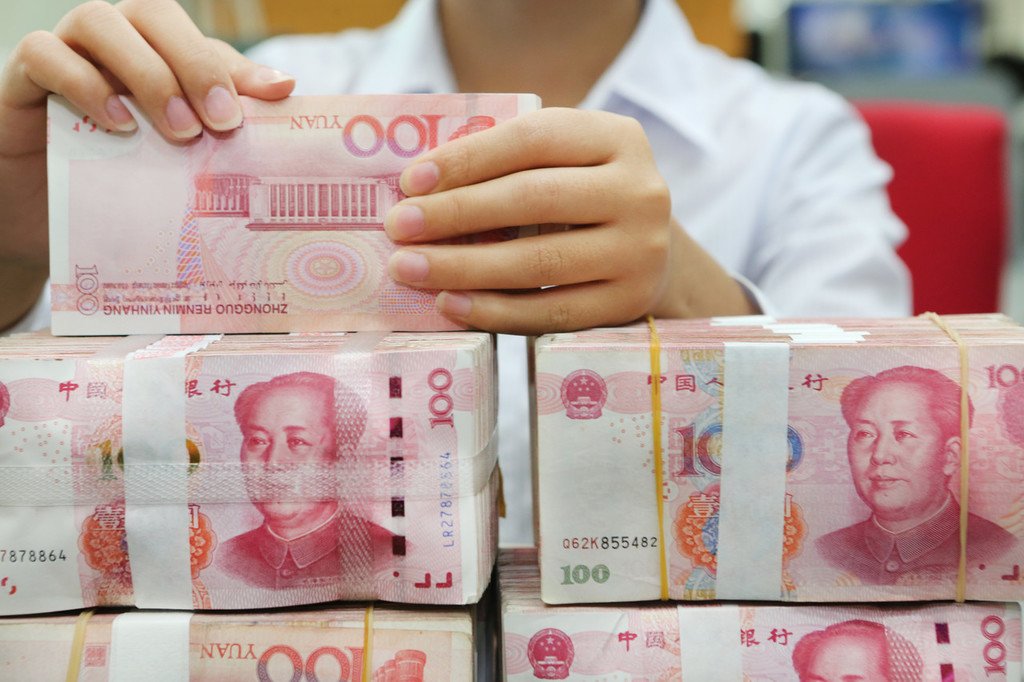
A Chinese employee counts yuan renminbi banknotes in Nantong, east China’s Jiangsu province. [Photo/IC]
Optimizing the regulatory system will be high on the agenda of China’s ongoing financial reform and will aim to ensure that the financial sector efficiently fulfills its fundamental duty of serving the real economy, according to leading Chinese financial experts.
Achieving high-quality development of the financial sector is of utmost importance to China’s quest for modernization, they said, as financial support is crucial to fostering new quality productive forces and sharpening the country’s edge in international competition.
To achieve that goal, strengthened oversight will be needed to ensure the financial sector is focused on serving the real economy, rather than personal interests such as letting funds float idly within the industry or compensating industry professionals disproportionately to their economic contributions, they said.
As for stock market reform, the immediate focus should be on further improving the most fundamental rules while restoring a reasonable level of valuation, with justified measures such as stepping up delistings and attracting long-term capital such as local social security funds, they added.
His comments came after Wang Jiang, executive deputy director of the Central Financial Commission’s office, said deepening financial reform requires strengthening risk prevention, stepping up supervision and promoting high-quality development. The commission is responsible for the high-level layout of China’s financial stability and development efforts.
In an interview with the People’s Daily on Friday, Wang called for the establishment of necessary “fences” and “firewalls” to perfect the financial regulatory system.
Liu Qiao, dean of the Guanghua School of Management at Peking University, said: “The main goal of strengthening regulation is to restore finance to its essence, which is to better serve the real economy. In other words, to promote new quality productive forces and better facilitate China’s modernization.”
Liu, who is also a professor of finance, said it is “almost unimaginable” that the world’s second-largest economy can gain an advantage in the new round of technological revolution without the high-quality development of finance. “Only the financial sector can allocate huge amounts of capital for technological innovation and foster entrepreneurship.”
Therefore, the recent regulatory scrutiny on the industry should not be taken as a sign that the importance of finance will be downplayed, but rather as a call for the industry to better promote China’s high-quality development, Liu said.
Tian Xuan, vice chancellor of Tsinghua University’s PBC School of Finance and director of the university’s National Institute of Financial Research, said: “We must deeply recognize that the fundamental nature of finance is that it is a service industry. Serving the real economy is its primary duty.”
It is unacceptable for financial activities to be separated from the real economy, for example, for financial institutions to use channel businesses to earn a commission by simply passing funds through them without contributing to the real economy, Tian stressed.
“In the broader context of recognizing the political and people-oriented nature of the financial industry, we need to address these phenomena,” he said.
As one of the key tasks to deepen the reform of the financial system, the resolution adopted in July at the third plenary session of the 20th Communist Party of China Central Committee called for refining the role and governance of financial institutions and improving incentive and restraint mechanisms to ensure that they serve the real economy.
Specifically, the resolution says China should improve capital market functions, give a balanced weight to investment and financing, and establish long-term mechanisms to enhance the underlying stability of the capital market.
As the capital market is seen as more capable of supporting innovative activity than the banking sector, China has accelerated capital market reform and the State Council, China’s cabinet, issued a guideline in April outlining nine measures to promote high-quality capital market development.
But experts say much more needs to be done. Nonfinancial firms raised just 144.5 billion yuan ($20.2 billion) through domestic stock markets in the first seven months of the year, compared with 18.87 trillion yuan in total financing to the real economy during the same period, data from the People’s Bank of China showed on Tuesday.
China’s A-share market also has ample room to improve investors’ return prospects, especially in a more volatile global financial landscape as U.S. stocks have slumped, they said. China’s benchmark Shanghai Composite Index has fallen 3.6 percent so far this year and closed at 2,867.95 points on Tuesday.
Zhang Ming, deputy director of the Institute of Finance and Banking at the Chinese Academy of Social Sciences, said the country’s capital market reform should prioritize improving the most basic rules and regulations, including fighting financial fraud, strengthening investor protection and promoting regular delistings.
The next step should be to attract more long-term capital, especially by gradually expanding the proportion that provincial-level social security funds can invest in the A-share market, said Zhang, who is also deputy director of the National Institution of Finance and Development.
Local social security funds, which currently invest mainly in bonds, can take advantage of the current low valuation of Chinese stocks and make low-priced equity investments in industry-leading companies to establish long-term investment portfolios, he said.
Once the A-share market stabilizes, other reform measures can be introduced, such as allowing more short selling and derivatives trading, Zhang said, adding: “Don’t rush and focus on the basics first.”
Liu, from Peking University, said it is important to encourage the interest of qualified institutional investors and even consider channeling more government funds, through fiscal authorities or the central bank, into the A-share market to correct the undervaluation.
“The urgent priority is to restore the market’s price discovery function,” Liu said, referring to restoring a reasonable level of valuation.
Li Zitong contributed to this story.
#Financial #regulation #system #improved